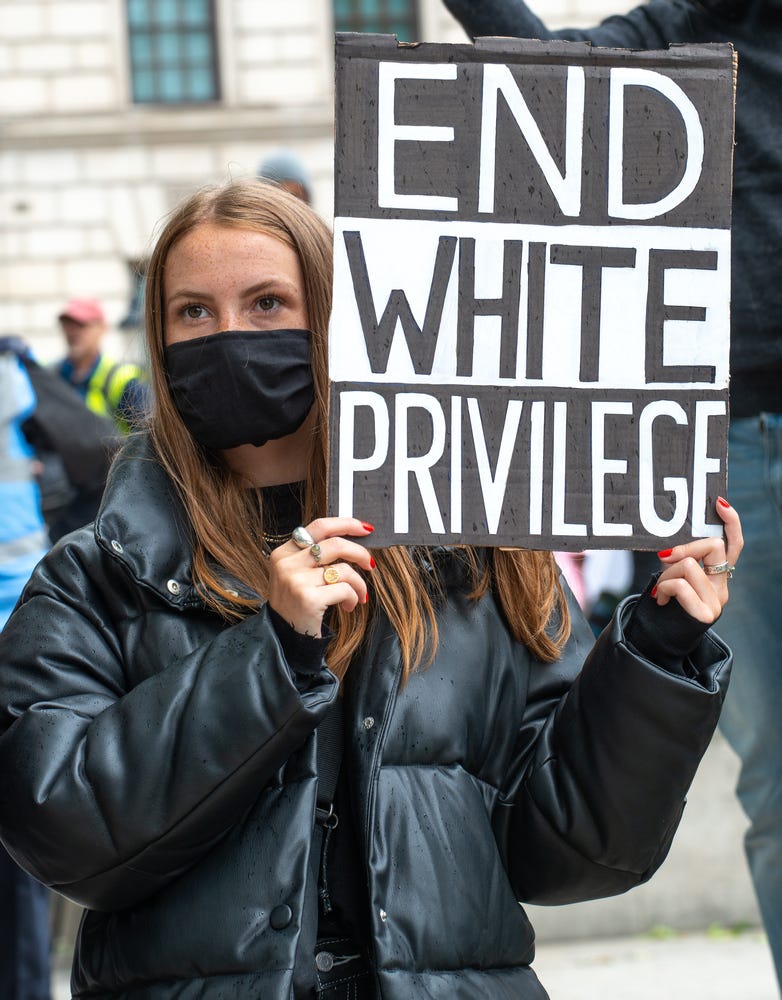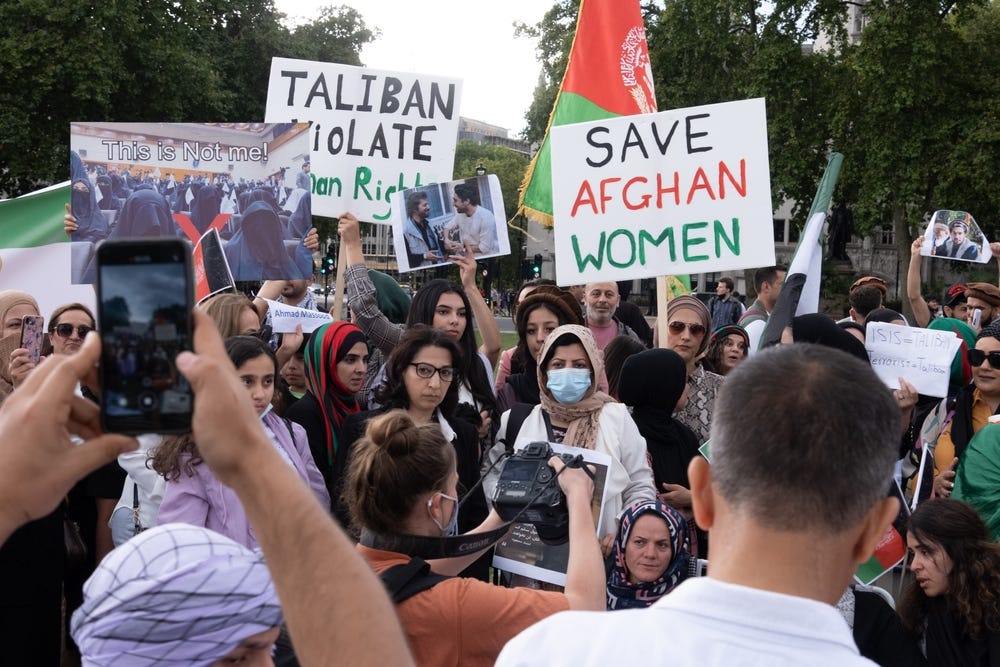E-Pluribus | October 17, 2022
Let 'white privilege' die; apartheid, Taliban style; and there's more than one path to authoritarianism.
A round-up of the latest and best writing and musings on the rise of illiberalism in the public discourse:
Quay Hanna: White Privilege
Drawing on his own background and the admittedly racist attitudes of his own upbringing, Quay Hanna has been writing and talking about race for decades. At Free Black Thought, Hanna explains why he believes the concept of “white privilege” is harmful and counterproductive.
Since I had never heard of “white privilege,” I asked the man to elaborate. He explained that I had a great many advantages because of my skin color. He highlighted my stable upbringing, pointed out that I hadn’t experienced poverty, and referenced my opportunity to go to college and pay for it as I went. He told me that I had to recognize all these privileges and acknowledge that people like me played a role in creating a system that oppresses black and brown people. In fact, I had to do my part in bringing down that system and building a new one.
Since the man knew very little about me other than what he read in the paper, I informed him that my dad—the son of a mother who died when he was two and an alcoholic father unable to take care of him—had grown up in poverty. He was raised in foster homes for almost a decade before a relative finally took him in to help work on the farm. My dad kept the outfit he was wearing that day—the only set of clothes he had at the time—to remind himself of where he started and his desire to change the path his family would be on. The Hanna side of the family was filled with alcoholism, drug addiction, unemployment, suicide, and even murder. My dad was determined to restore the family name, to discard a legacy of defeat, and create a new family ethos rooted in responsibility, wisdom, and success.
I also shared with the man stories about the many people whom I had encountered in my life. I had met thousands of people in college and on my travels around the world and they came from a wide range of backgrounds, some with stories like my own and others that came from extremely wealthy circumstances and environments. I tried to point out that it seemed to me that no matter their skin color, those who succeeded were the ones like my dad, who worked the hardest and made the most of whatever opportunities they had been dealt. I had rarely met a human being that didn’t have many obstacles to overcome, both from within their family and from the society around them. I told him that I was extremely grateful for the good fortune of my upbringing, but that linking it to my skin color was insulting.
Read the whole thing.
Naheed Farid: The Taliban’s Gender Apartheid Regime
While the oppression of women is hardly unique to the Taliban’s style of totalitarianism, the stark contrast between the Afghanistan of just a little over a year ago and now particularly makes it worth examining. At The Dispatch, Naheed Farid details the draconian and cruel measures instituted by the regime and explains why it is especially important that the international community lends no credibility or legitimacy to that government.
The weaponization of gender apartheid as a theocratic totalitarian cudgel should come as no surprise given the Taliban’s track record from 1996 to 2001. What is surprising, however, is the speed and efficiency with which the Taliban has moved. Today, Afghan women across the world feel abandoned by the international community, that their voices are unheard, and that their demands are neglected in discussions and policies impacting the future of their country.
In March, the Security Council gave the United Nations Assistance Mission in Afghanistan (UNAMA) one of the strongest human rights and gender equality mandates in the world. The mandate’s first crucial agenda was to protect women by mainstreaming gender as a cross-cutting issue through conducting monitoring and reporting on the human rights situation on the ground. But six months after the mandate’s adoption, there has been little to no progress in upholding quality of life or individual freedoms for Afghans. In fact, for Afghan women and girls, we’ve witnessed a vivid regression in rights over the last 12 months, amounting to the world’s biggest human rights crises.
The international community has done little to stem the effects of the Taliban policies. There is an alarming pattern of women taking their lives out of hopelessness and despair, the ultimate indicator of how bad the situation is for Afghan women and girls. Death is seen as preferable to living in today’s Afghanistan under the Taliban.
Read it all here.
Joel Kotkin: Three Paths to Despotism
Authoritarianism isn’t as much about ideology as it is about power. While despots may have different starting points, they all end up in the place, suppressing the liberty of citizens to pursue life, liberty and happiness, writes Joel Kotkin at Quillette.
The revival of the populist Right represents the clearest face of resurgent authoritarianism. Its illiberal parties and movements reject the basic logic of economic globalism and constitute a reaction to the perceived contempt with which many leading institutions treat national, religious, and family values. This is made explicit in the program of the Brothers of Italy.
[ . . . ]
[I]t’s economic dislocation that will provide the populist Right’s resurgence with its critical fuel. The key may lie with what historian Eric Weitz identifies as “the proletarianization of the middle class” in his book, Weimar Germany: Promise and Tragedy. Today, as in Germany during the 1930s, many shopkeepers, farmers, and artisans feel threatened by inflation, and by the growing power of large corporations, Wall Street magnates, and tech oligarchs. In 2020, small-business owners in America were among Donald Trump’s strongest supporters, while shop owners across Europe still face potentially disastrous conditions.
[ . . . ]
[T]he Left across the West has become increasingly authoritarian and intolerant of dissenting views.
This shift has occurred as progressives have grown to dominate many of society’s most critical institutions such as academia and the media, and have sought to fortify their position with the tools of authoritarianism. This near-total dominance of the cultural heights of Western societies has been marked by increasing political dogmatism, a penchant for censorship, and contempt for those who diverge from their orthodoxies. “The current religion of Western liberals in politics and media,” notes writer Glenn Greenwald, “is censorship: their prime weapon of activism.”
Universities have been the prime incubators of this shift. Once a bastion of open inquiry, higher education is now defined by ideological homogeneity, particularly among the faculty. This, according to a recent study, has been particularly true at liberal arts colleges, some departments of which have become entirely “Republican-free.”
Read it all.
Around Twitter
The Foundation for Individuals Rights and Expression with a concerning development from the University of Minnesota Medical School:
Oliver Traldi observes a rather noticeable ideological trend in the MacArthur Foundation “Genius” awards, but on the bright side, no “infamous public idiots” this year!
And finally, you may have been under the impression that “men can’t be lesbians” was uncontroversial. You would be wrong, at least in Norway:









